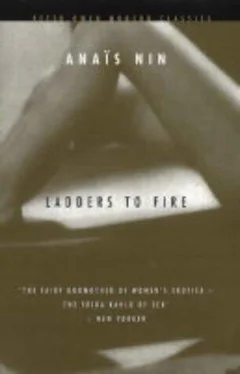Anaïs Nin - Ladders to Fire
Здесь есть возможность читать онлайн «Anaïs Nin - Ladders to Fire» весь текст электронной книги совершенно бесплатно (целиком полную версию без сокращений). В некоторых случаях можно слушать аудио, скачать через торрент в формате fb2 и присутствует краткое содержание. Год выпуска: 2004, ISBN: 2004, Издательство: Peter Owen Limited, Жанр: Классическая проза, Эротические любовные романы, на английском языке. Описание произведения, (предисловие) а так же отзывы посетителей доступны на портале библиотеки ЛибКат.
- Название:Ladders to Fire
- Автор:
- Издательство:Peter Owen Limited
- Жанр:
- Год:2004
- ISBN:9780720611625
- Рейтинг книги:5 / 5. Голосов: 1
-
Избранное:Добавить в избранное
- Отзывы:
-
Ваша оценка:
- 100
- 1
- 2
- 3
- 4
- 5
Ladders to Fire: краткое содержание, описание и аннотация
Предлагаем к чтению аннотацию, описание, краткое содержание или предисловие (зависит от того, что написал сам автор книги «Ladders to Fire»). Если вы не нашли необходимую информацию о книге — напишите в комментариях, мы постараемся отыскать её.
Cities of the Interior
Children of the Albatross
The Four-Chambered Heart
A Spy in the House of Love
Solar Barque
Ladders to Fire — читать онлайн бесплатно полную книгу (весь текст) целиком
Ниже представлен текст книги, разбитый по страницам. Система сохранения места последней прочитанной страницы, позволяет с удобством читать онлайн бесплатно книгу «Ladders to Fire», без необходимости каждый раз заново искать на чём Вы остановились. Поставьте закладку, и сможете в любой момент перейти на страницу, на которой закончили чтение.
Интервал:
Закладка:
Lillian was standing near him and they had just been discussing their life together. Jay had admitted that he would not work. He could not bear repetition, he could not bear a “boss,” he could not bear regular hours. He could not bear the seriousness.
“Then you will have to be a hobo.”
“I’ll be a hobo, then.”
“A hobo has no wife,” said Lillian.
“No,” he said. And added nothing: If she became part of the effort, he would not cling to her either.
“I will have to work, then,” she said. “One of us has to work.”
He said nothing.
Lillian was doubly disturbed by the unfamiliarity of the scene, the portentousness of it, and by the familiarity of the white shirt. The white shirt disturbed her more than his words. And then she knew. The white shirt reminded her of her husband. Just before he put on his coat she had always seen him and obscurely felt: how straight and rigid he stands in his white shirt. Black and white. Definite and starched, and always the same. But there it was. She was not sure she had liked the white shirt. From it came authority, a firm guidance, a firm construction. And now she was again facing a white shirt but with a strange feeling that there was nothing in it: no rigidity, no straight shoulders, no man. If she approached she would feel something fragile, soft and wavering: the shirt was not upheld by the body of the man. If she broke suddenly at the idea of assuming the responsibility, if she broke against this shirt it would collapse, trn to sand, trickle sand and soft laughter and elusive flickering love.
Against this white shirt of the husband she had lain her head once and heard a strong heart beat evenly, and now it was as if it were empty, and she were in a dream of falling down soft sand dunes to softer and more sliding shifty sand dunes… Her head turned.
She kept herself on this new equilibrium by a great effort, fearing to touch the white shirt of weakness and to feel the yielding, the softness and the sand.
When she sewed on buttons for him she was sewing not only buttons but also sewing together the sparse, disconnected fragments of his ideas, of his inventions, of his unfinished dreams. She was weaving and sewing and mending because he carried in himself no thread of connection, no knowledge of mending, no thread of continuity or repair. If he allowed a word to pass that was poisoned like a primitive arrow, he never sought the counter-poison, he never measured its fatal consequences. She was sewing on a button and the broken pieces of his waywardness; sewing a button and his words too loosely strung; sewing their days together to make a tapestry; their words together, their moods together, which he dispersed and tore. As he tore his clothes with his precipitations towards his wishes, his wanderings, his rambles, his peripheral journeys. She was sewing together the little proofs of his devotion out of which to make a garment for her tattered love and faith. He cut into the faith with negligent scissors, and she mended and sewed and rewove and patched. He wasted, and threw away, and could not evaluate or preserve, or contain, or keep his treasures. Like his ever torn pockets, everything slipped through and was lost, as he lost gifts, mementos—all the objects from the past. She sewed his pockets that he might keep some of their days together, hold together the key to the house, to their room, to their bed. She sewed the sleeve so he could reach out his arm and hold her, when loneliness dissolved her. She sewed the lining so that the warmth would not seep out of their days together, the soft inner skin of their relationship.
He always admitted and conceded to his own wishes first, before she admitted hers. Because he was sleepy, she had to become the panoply on which he rested. Her love must fan him if he were warm and be the fire if he were cold. In illness he required day and night nursing, one for the illness, the other for the pleasure he took in her attentiveness.
His helplessness made him the “ homme fatal“for such a woman. He reached without sureness or nimbleness for the cup, for the food. Her hand flew to finish off the uncertain gesture, to supply the missing object. His hunger for anything metamorphosed her into an Aladdin’s lamp: even his dreams must be fulfilled.
Towards the greater obstacles he assumed a definitely noncombatant attitude. Rather than claim his due, or face an angry landlord, or obtain a rightful privilege, his first impulse was to surrender. Move out of the house that could not be repaired, move out of the country if his papers were not in order, move out of a woman’s way if another man stalked too near. Retreat, surrender.
Atimes Lillian remembered her husband, and now that he was no longer the husband she could see that he had been, as much as the other men she liked; handsome and desirable, and she could not understand why he had never been able to enter her being and her feelings as a lover. She had truly liked every aspect of him except the aspect of lover. When she saw him, with the clarity of distance and separation, she saw him quite outside of herself. He stood erect, and self-sufficient, and manly. He always retained his normal male largeness and upstanding protectiveness.
But Jay… came towards her almost as a man who limps and whom one instinctively wishes to sustain. He came as the man who did not see very well, slightly awkward, slightly stumbling. In this helplessness, in spite of his actual stature (he was the same height as her husband) he gave the air of being smaller, more fragile, more vulnerable. It was this fear in the man, who seemed inadequate in regard to life, trapped in it, the victim of it, which somehow affected her. In a smaller, weaker dimension he seemed to reach the right proportion for his being to enter into hers. He entered by the route of her compassion. She opened as the refuge opens; not conscious that it was a man who entered (man of whom she had a certain suspicion) but a child in need. Because he knocked as a beggar begging for a retreat, as a victim seeking solace, as a weakling seeking sustenance, she opened the door without suspicion.
It was in her frenzy to shelter, cover, defend him that she laid her strength over his head like an enormous starry roof, and the stretching immensity of the boundless mother was substituted for the normal image of the man covering the woman.
Jay came and he had a cold. And though he at first pretended it was of no importance, he slowly melted entirely into her, became soft and tender, waiting to be pampered, exaggerating his cough. And they wandered through the city like two lazy southerners, he said, like two convalescents. And she pampered him laughingly, ignoring time, eating when they were hungry, and seeing a radium sunlight lighting up the rain, seeing only the shimmer of the wet streets and not the greyness. He confessed that he craved a phonograph, and they shopped together and brought it back in a taxi. They slept soundly inside the warmth of this closeness, in the luxury of their contentment. It was Jay who touched everything with the magic of his contentment. It was Jay who said: isn’t this ham good, isn’t this salad good, isn’t this wine good. Everything was good and savory, palatable and expansive.
He gave her the savor of the present, and let her care for the morrow.
This moment of utter and absolute tasting of food, of color, this moment of human breathing. No fragment detached, errant, disconnected or lost. Because as Jay gathered the food on the table, the phonograph to his room, he gathered her into the present moment.
His taking her was not to take her or master her. He was the lover inside of the woman, as the child is inside of the woman. His caresses were as if he yearned and craved to be taken in not only as a lover; not merely to satisfy his desire but to remain within her. And her yearning answered this, by her desire to be filled. She never felt him outside of herself. Her husband had stood outside of her, and had come to visit her as a man, sensually. But he had not lodged himself as Jay had done, by reposing in her, by losing hielf in her, by melting within her, with such feeling of physical intermingling as she had had with her child. Her husband had come to be renewed, to emerge again, to leave her and go to his male activities, to his struggles with the world.
Читать дальшеИнтервал:
Закладка:
Похожие книги на «Ladders to Fire»
Представляем Вашему вниманию похожие книги на «Ladders to Fire» списком для выбора. Мы отобрали схожую по названию и смыслу литературу в надежде предоставить читателям больше вариантов отыскать новые, интересные, ещё непрочитанные произведения.
Обсуждение, отзывы о книге «Ladders to Fire» и просто собственные мнения читателей. Оставьте ваши комментарии, напишите, что Вы думаете о произведении, его смысле или главных героях. Укажите что конкретно понравилось, а что нет, и почему Вы так считаете.












